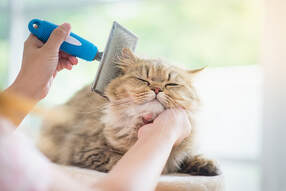|
There are so many perks to owning pets that we couldn’t possibly list them all. But hairballs definitely aren’t one of them! These slimy clumps of matted fur are probably well known to the cat owners amongst you, and have most likely been discovered when wandering around the house in your bare feet. Hairballs are generally harmless, but in certain animals can be fatal and should be treated with caution and prevented if possible. Hairballs are mostly found in cats, although they do also occur in rabbits. Both these animals self groom in similar ways, and their tongues cause them to pick up dead fur and swallow it. As hair isn’t digested properly, it often ends up becoming knotted in the stomach, from where it’s vomited back up. Unfortunately rabbits lack this regurgitation mechanism, and hairballs in this animal can be fatal, causing dehydration and death. If you suspect your rabbit has a hairball, then seek veterinary help immediately. They are far less fatal in cats, although they can be uncomfortable and can lead to problems if not treated. If your cat is prone to hairballs, then prevention is key to your animal’s health. We’ve listed below some of the easiest ways to prevent hairballs. Regular Grooming - This is particularly important during shedding season, as the cold weather warms up and your cat sheds their thick winter coat. Daily grooming of your cat, especially those with longer fur, removes excess hair and vastly reduces the quantity that they will swallow after cleaning. Even during the summer months, daily brushing will not only help you bond with your cat, but will greatly reduce the build up of hair in their stomachs. Hydration - Ensure your cat has a ready supply of clean drinking water. The more hydrated your cat is, the easier it is for their digestion to work and remove fur that’s found it’s way into their stomachs, allowing it to pass naturally through their bodies without building up into a hairball. High Quality Dry Feed - Maintaining good levels of fibre in your cat’s diet ensures a healthy digestive system that is moving regularly, reducing the chances of hair build up. You can even buy food that is specifically formulated to prevent hairballs in the stomach, particularly useful if your cat suffers from them regularly. Lubricant Gel - If you have a cat who, despite regular grooming, still suffers from hairballs, then specialist gel/paste can be used to prevent hair from sticking in their stomach. These are often flavoured and make a tasty treat for your cat, and some contain a probiotic to optimise the health of your cat’s digestive system. Reducing the occurrence of hairballs doesn’t take much work, and will greatly increase the comfort of your cat (and your bare feet in the morning!). If you’ve tried the above and your cat is still suffering from regular hairballs, then speak to your vet as there may be underlying causes.
0 Comments
Leave a Reply. |
Archives
July 2024
Categories |


 RSS Feed
RSS Feed